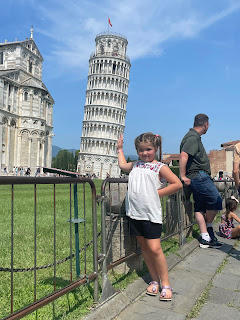 |
| Margaux Kelly. |
The Press Democrat/Sonoma Index-Tribune asked questions today about the Supreme Court's rejection of race-conscious college admissions, and the impact on Sonoma Valley Unified's students. Answers are below. Photo is Margie, clowning around with her sisters at the Leaning Tower of Pisa.
---
1. What do you think about the Supreme Court's Decision?
62% of Americans now lack confidence in the Supreme Court, with only 37% expressing a great deal or quite a lot of confidence in the institution. Decisions like the one today, and the increasingly common revelations of corruption amongst the conservative justices, continue to destroy the bench's hard-earned reputation. Undisclosed gifts from wealthy right-wing donors who have business before the court are anathema to the maintenance of the public's trust. When coupled with further anti-democratic policymaking from the court, the justices are continuing to act in a fashion inconsistent with Americans' belief in due process. The justices should have left the matter to the President and to the Congress, rather than reigniting yet another culture war. I expect there will be little of benefit to show for their most recent detour into legislating from the bench.
2. How will it affect Sonoma Valley students who are planning to attend colleges and universities?
The long-term impact is probably greater than the short-term one. Racism is real in American society, and, as Barack Obama has noted, generations of students have been systematically excluded from most of America’s key institutions. Students will continue to be discriminated against in their efforts to get the seats at the table they deserve. As a country and as a society, we must work to end the horrible effects of prejudice on the basis of race, sex, or ethnicity.
In the short term, it is important to note that the vast majority of Sonoma Valley's high school students attend California's public institutions of higher education. California's voters have prohibited state governmental institutions from considering race, sex, or ethnicity in the areas of public employment, public contracting, and public education since Proposition 209 was passed in 1996. That policy was for practical purposes reaffirmed with the defeat of Proposition 16 in November 2020, 57%-43%, despite the Proposition enjoying near-universal support from a wide range of educators, civil rights leaders, and California businesses.
Initially, there were stark consequences for California's flagship public universities from the end of affirmative action. However, those institutions have worked hard to restore diversity to their campuses. In 2021, for example, UCLA's in-state first-year class included more Black students — 346, or 7.6 % — than their 1995 numbers of 259, or 7.3%. The same is true for Latino students, whose numbers grew to 1,185, or 26%, from 790, or 22.4%, during that same period. This is generally attributed to recruiting diverse students, and working relentlessly to persuade those students to accept admission offers.
The California State University system, with 23 campuses, never experienced the same dramatic drop in Black and Latino students after Proposition 209. Indeed, CSU currently closely mirrors the state's diversity. As of fall 2021, 47% of its 422,391 undergraduates are Latino, 21% are white, 16% are Asian, and 4% are Black, which aligns closely with the demographic breakdown of California high school students who met UC and CSU eligibility standards in 2020-21.
My sense is that the hard work done in California since Proposition 209 will protect this year's class from the destabilizing and destructive consequences of a Supreme Court that has decided to impose its policy preferences on the country at large. Again, California is at the forefront of ensuring all of our citizens' civil rights are protected, regardless of the continuing ridiculous behavior in Washington.
3. How will this affect their pursuit of careers?
The long-term consequences of the destructive and backward imposition of conservative policy preferences via unelected judges should alarm all Americans. As we have seen over the past few years, civil rights long protected under Federal law, rights recognized and supported by the majority of Americans, are susceptible to reversal by an institution that continues to be plagued by crass corruption that is unacceptable and illegal at virtually every other level of government.
I idealized our Supreme Court as a student in school, and the belief that justice under our Constitution was available for all Americans was amongst the strongest of reasons that motivated me to study law at the highest level, despite the hardship incident to that effort. To see those principles undermined for mere political advantage despite the empirical evidence in support of their continuance, and in the face of the overwhelming support of those policies by leaders from across our society, strikes at the same idealism that motivates our students today. There is nothing so valuable to the future of our country as the belief of our students that the values America is founded upon will be supported and fought for by those in positions of power. I can only imagine the discouragement and cynicism that today's decision will foster.
We increasingly seem to live in a country that believes the strong should be allowed to do what they will, and the weak deserve to suffer what they must. That ancient maxim has led to the destruction of civil society wherever it has been instituted. The hope of all Americans is that this madness can end, and that our enduring belief in justice, due process, and democratic self-governance, government that is of, by, and for the people, will again find its rightful place at the center of our civil discourse.
4. Would you like to say anything else?
No, thank you.